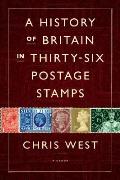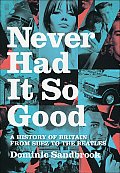
Writing popular history is a balancing act, and the people who do it most successfully get the balance right: Max Hastings in
All Hell Let Loose, Dominic Sandbrook in
Never Had It So Good. Part of the balance has to do with tone: get too academic and readers will switch off; be too demotic and people will stop taking you seriously. Another balancing act is related to how much of yourself you put in the narrative. Traditionally the historian has been an invisible puppeteer. Wise readers know that he or she is manipulating the story, deciding what to include, what to leave out, what to emphasize, and what to play down. But the old-school historian never appeared in person. Modern writers like to peep over the parapet a little: Joe Moran's
On Roads, for example. Others take it further, making the story some kind of personal journey.
The "personal journey" is one way of giving the narrative an "angle." In my most recent book, A History of Britain in Thirty-Six Postage Stamps, I used postage stamps as a route into the history of Great Britain (I'm now doing the same for the USA). I have found taking this approach to be hugely enjoyable. Stamps tell stories; they are clear statements about how a nation sees itself at a given time, yet they are also deeply personal — the stamp sitting quietly in an album might have once been used to send a declaration of love or a furious rebuke through the mail. Both aspects inevitably make one wonder what life was like at the time of posting (a precise time, if the stamp bears a postmark).
The point of the angle is not just to "be different" but to make new connections, and help other people make them. That, surely, is what creative intelligence is all about.
The basic rules of storytelling apply to popular history. You can't beat curiosity — what happens next? Even if people know roughly what happened next, expand a bit — what exactly happened next? And even if we know pretty well what happened, we still want the moment to be brought to life rather than just related — to be in Ford's Theatre on Good Friday, 1865... Novelists can make up the telling detail that performs this magic; the historian has to find one.
 Looking the other way down the telescope, it is a mistake to assume that readers of popular history are not interested in "big" themes: the philosophical, intellectual currents that bring events about, or the great strategic currents that ebb and flow in war. Bring on Eugene Fama's efficient market hypothesis if you think it caused the 2008 crash — just don't make it dull. Popular science and historical writing has made huge strides in the last 10 years in making big ideas accessible without dumbing them down.
Looking the other way down the telescope, it is a mistake to assume that readers of popular history are not interested in "big" themes: the philosophical, intellectual currents that bring events about, or the great strategic currents that ebb and flow in war. Bring on Eugene Fama's efficient market hypothesis if you think it caused the 2008 crash — just don't make it dull. Popular science and historical writing has made huge strides in the last 10 years in making big ideas accessible without dumbing them down.
Like novelists, popular historians have to keep the story alive and flowing. Like the best academic historians, they have to master the issues behind the stories. Like any decent historian, they must tell the truth. It's a great genre to work in.